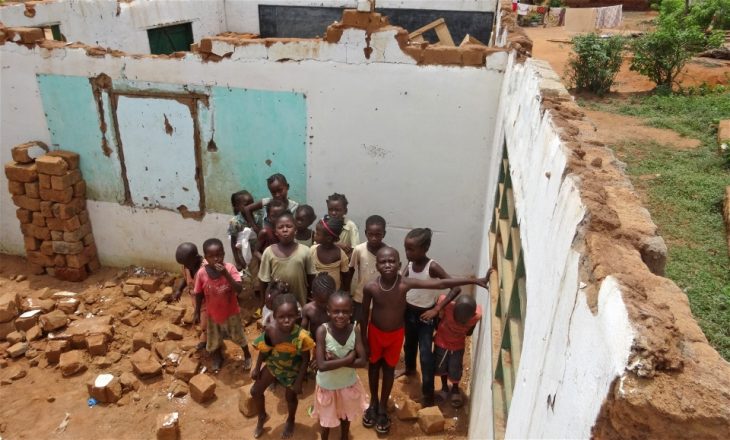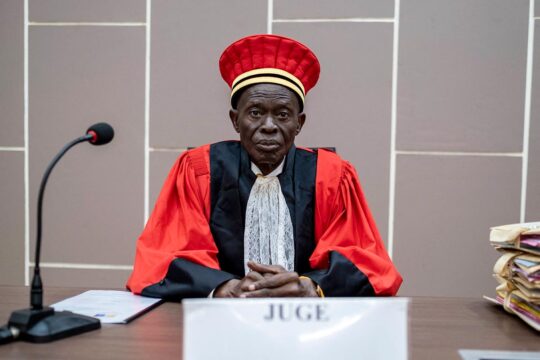In countries struggling to emerge from conflict, the fight against impunity for war criminals is essential. But to carry out this fight, the national justice system must be effective, and, too often, this is far from being the case (e.g., the Central African Republic, CAR). Instead of offering empty promises, source of dangerous frustration for the peoples concerned, the focus must be put on non-judicial efforts for reconciliation. Mediators must take this reality into account.
In late September, Bangui, the capital of the Central African Republic, was once again shaken by violence, with dozens killed and some 600 prisoners who escaped from the country’s main prison. This episode of violence is the latest symptom of a crisis in a country where governmental authority is virtually nonexistent and the judicial system destroyed. Few of the 120 judges in the Central African Republic – one for every 35,000 people in a country 15 times the size of Switzerland – ever venture outside of Bangui, while the Ministry of Justice, looted long ago, has never been set right. In any case, the people of CAR have great mistrust in their nation’s courts, seeing them as a tool of the rich and powerful - a suspicion which has unfortunately proven to be well-founded.
A polarized society
It was in this dramatic setting that the Bangui National Forum opened last May with the goal of pulling the country out of its current crisis, during which both the former Séléka militia and the anti-Balaka fighters committed appalling crimes. The latter’s work was most tragically illustrated by its anti-Muslim pogroms in December 2013 and January 2014, attacks so bloody that the United Nations described them as “pre-genocidal”. The CAR society is polarized between Muslims associated to the ex-Séléka, generally considered to be foreigners, and the Christian majority that considers itself invaded by Chadian and Sudanese fighters with the complicity of local Muslims. On both sides, fear and hostility is fomented and manipulated by warlords seeking better control of the country’s great mineral wealth (uranium, gold and diamonds).
The National Forum of Bangui (NFB) produced the Republican Pact, a roadmap to save the country from collapse. Besides the issues of governance, security and development, the NFB calls for -- in the name of national reconciliation -- the establishment of a Special Criminal Court, the restoration and independence of the judicial system, the prosecution of war criminals, the establishment of a Truth and Reconciliation Commission and the use of traditional mechanisms of dispute resolution. All of these approaches combined form the standard “toolkit” of transitional justice. But the tools of transitional justice were originally forged in radically different contexts: whether in Latin America, South Africa or Central/Eastern Europe, transitional justice has in the past been about the peaceful transfer of power, from authoritarian States with human rights violations to new democratic governments.
A failed state
In the case of the Central African Republic, however, the situation is that of a failed state. Yes, the International Criminal Court (ICC) has been asked in; but, by definition, the ICC’s role, while symbolically important, will be modest: at most, it will indict a handful of officials. As for the CAR’s own judicial system, State authority must itself be reestablished for the country’s courts to play a major role, and that prerequisite is far from fulfilled. Proposals for a Special Criminal Court, for the restoration of the judicial system, therefore, make sense, at best, in the medium term, and only if the international donors contribute...
Transitional authorities in the Central African Republic and the international community have used the toolkit of transitional justice without adapting it to the local context. Not only has the sequence of events been inverted, but, more fundamentally, transitional justice has been assigned the mission of rebuilding the Central African Republic’s failed state: no more, no less than state-building. The case is not the same as that of South Africa or Argentina, where the mechanisms of justice and reconciliation were created after democracy was restored. Rather, CAR’s case is about creating these mechanisms so that the State can be set up again. This is a far more significant challenge and an impossible one to accomplish in the short term.
disarmament
First of all, the Central African Republic must exit the vicious circle it is currently in, where the lack of security and the rule of law obliterate political progress. The challenge - and it is enormous - is to establish a comprehensive approach that includes disarmament of combatants in conjunction with a Truth, Justice and Reconciliation Commission. In such a context, amnesty could be granted to (ex-)combatants provided the norms of international law are respected. This would break the vicious circle in the Central African Republic, where impunity has led to the abandonment of the State, with the country split into fragments held by armed groups, preventing any resolution to the crisis and to all economic development.
Unfortunately, enthusiasm raised by the Bangui National Forum dangled immediate solutions in front of the people. However, none of the decisions taken at the BNF even began to be implemented. The result has been deep frustration, in itself contributing to new violence.
Does this mean that justice should not be sought in the short term, until the slow process of (re) establishing the judiciary is fully accomplished? Not at all. Despite all the obstacles, the focus should be on traditional processes of dispute resolution, adapted to the needs of the peoples. Central Africans can learn from the Gacaca experience in Rwanda, which incorporates elements of traditional justice and puts responsibility at the community level. Politicians can play a key role in this process. Local realities offer opportunities for action and it is urgent to take them. That way, the darkest page in the turbulent history of the Central African Republic might finally be turned.
This article was originally published in Le Monde on Oct. 30, 2015






